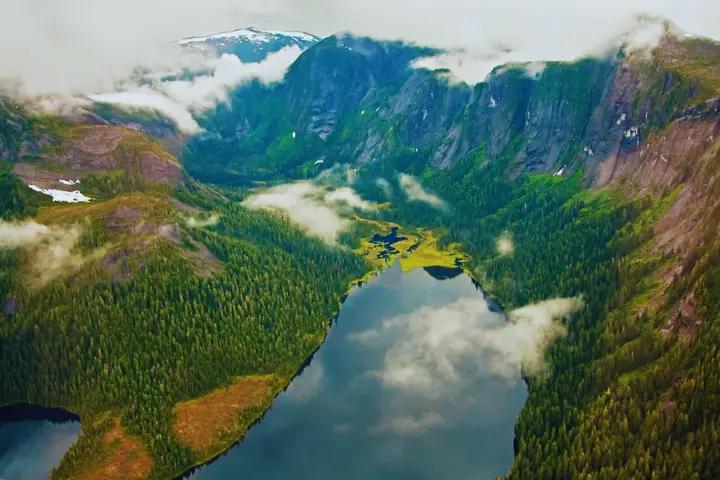Alaska Files Lawsuit Against the U.S. Government Challenging Tongass Forest Protection Measures

In a recent legal battle, the state of Alaska has taken a stand against President Joe Biden's administration, seeking to overturn a decision that could have far-reaching consequences for its economy and environmental policies.
The lawsuit, filed in federal court in Anchorage, revolves around the administration's move to reverse an approach initiated by former President Donald Trump. This policy had opened up extensive portions of the Tongass National Forest, one of the largest wilderness areas in the United States, to logging and mining activities.
A Fight Over the Tongass National Forest
The Tongass National Forest, located in southeastern Alaska, is a vast and ecologically significant expanse of land. Covering approximately 16.7 million acres, it is often referred to as the "crown jewel" of the National Forest System.
The dispute stems from President Biden's January decision, made through the U.S. Department of Agriculture (USDA), to reinstate protections for 9.37 million acres of this pristine wilderness.
Alaska's Economic Concerns
The state of Alaska's lawsuit argues that this decision jeopardizes its economy. The USDA's move threatens to reduce state tax revenues and increase the financial burden on remote communities near the forest by prohibiting timber harvests and mining for essential minerals in the Tongass.
Furthermore, it hinders economic development in the region.
Legal Challenges
One of the central claims in Alaska's lawsuit is that the USDA failed to provide adequate justification for its decision, violating federal law. The USDA had not responded to these allegations at the time of the case.
Alaska also asserts that the reversal goes against the Alaska Statehood Act, which transferred significant federal land to the state to support its economic self-sufficiency.
The Roadless Rule and Environmental Concerns
Under the USDA's decision, the Tongass National Forest is again subject to the 2001 Roadless Rule. This rule prohibits road construction and timber harvesting in protected and undeveloped areas of U.S. forests.
The USDA justified this move as a necessary step in combatting climate change, as the Tongass Forest acts as a substantial carbon sink, absorbing large amounts of carbon dioxide.
Also Read, US Virgin Islands Seeks $190M from JPMorgan in Epstein Case
A Policy Reversed
It's worth noting that the protections removed in 2020 during the Trump administration's tenure were seen as efforts to ease environmental regulations that hindered industrial activities.
The lawsuit filed by Alaska seeks to invalidate the repeal and block the administration from applying the Roadless Rule to the Tongass National Forest.
Broader Environmental Actions
The Tongass National Forest is not the only environmental issue at play in Alaska. The U.S. Interior Department recently announced the cancellation of oil and gas leases in the Arctic National Wildlife Refuge.
These leases, acquired by an Alaska state development agency during the final days of the Trump presidency, were seen as a threat to the region's wildlife, including polar bears and caribou. President Biden's administration has pledged to protect this 19.6 million-acre refuge.
Conclusion
The legal battle between Alaska and the Biden administration highlights the complexities of balancing economic interests with environmental concerns.
The fate of the Tongass National Forest and other environmental policies in Alaska hangs in the balance, as the courts will ultimately decide the outcome of this dispute.
Also Read, Top 10 Netflix Series of All Time Shows
Frequently Asked Questions
What is the Tongass National Forest?
The Tongass National Forest is a vast wilderness area in southeastern Alaska, covering approximately 16.7 million acres. It is known for its ecological significance and has been the center of recent legal disputes regarding logging and mining activities.
Why did the Biden administration reinstate protections for the Tongass National Forest?
The administration's decision to reinstate the Tongass National Forest protections was motivated by environmental concerns, particularly the need to combat climate change. The forest is a significant carbon sink, absorbing substantial amounts of carbon dioxide.
What is the Roadless Rule, and how does it affect the Tongass National Forest?
The Roadless Rule prohibits road construction and timber harvesting in protected and undeveloped areas of U.S. forests. The USDA's decision reinstated this rule in the Tongass to preserve its ecological integrity.
What is the Alaska Statehood Act, and how does it relate to this lawsuit?
The Alaska Statehood Act transferred federal land to Alaska to help it become economically self-supporting. The state of Alaska argues that the USDA's decision violates this act by hindering economic development in the Tongass.
What other environmental actions has the Biden administration taken in Alaska?
In addition to the Tongass National Forest, the Biden administration canceled oil and gas leases in the Arctic National Wildlife Refuge, aiming to protect the region's wildlife and natural resources.
Legal proceedings are ongoing, and the outcomes may change over time.
Business News
The Connection Between Mental Well-Being and How We Live
Holistic Living: Caring for Your Mind, Body, and Surroundings
Mental Clarity: The Real Starting Point for a Balanced Life
Wendy's Just Reversed Course From New Approach With 'Project Fresh,' Following A Hefty Sales Hit.
How to Transform the Workplace into a Safe Space




















